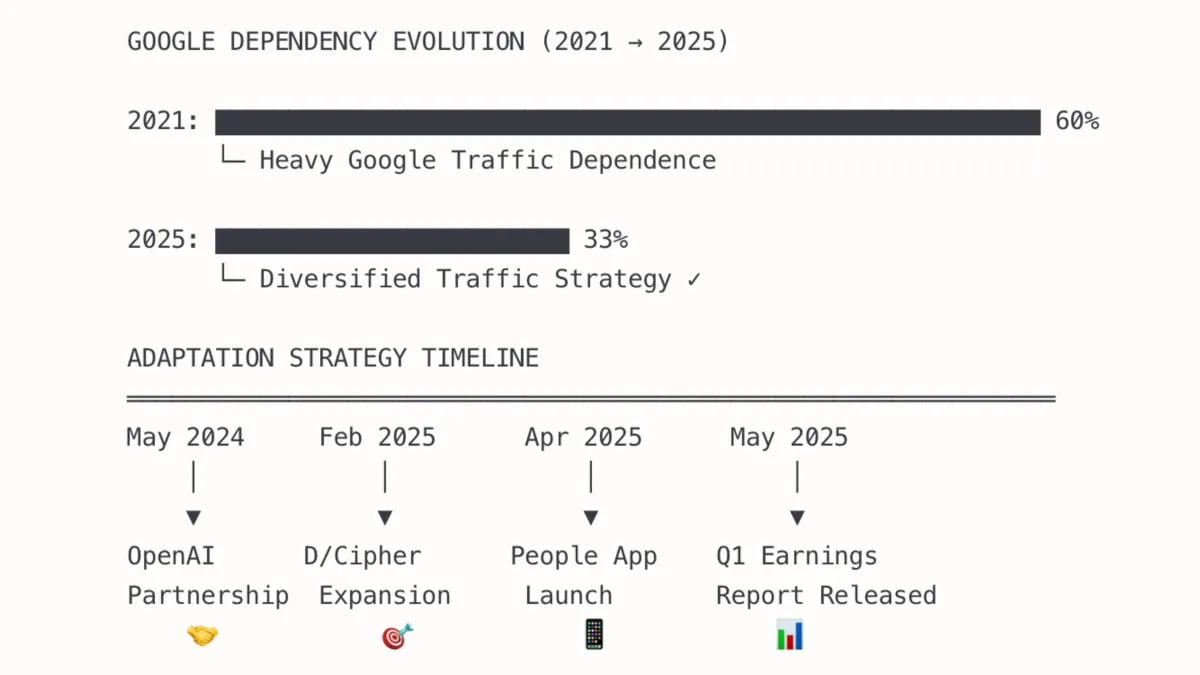
The publisher industry received a stark illustration of artificial intelligence's growing influence on digital traffic patterns when IAC Inc. reported its first quarter 2025 earnings on May 5, revealing that Google's AI Overviews feature has begun affecting one of America's largest digital publishers.
According to IAC's quarterly filing with the Securities and Exchange Commission, Dotdash Meredith experienced "a 3% YOY decline in core user sessions, which caused a dip in programmatic ad revenue." The company attributed this decline partially to "weakening referral traffic from search platforms," specifically noting that "DDM is starting to see Google Search's AI Overviews eat into its traffic."
During the earnings call, Dotdash Meredith CEO Neil Vogel provided specific details about the scope of this impact. "AI Overviews appear on roughly a third of search results related to DDM's content," Vogel stated, adding that publishers "see a little performance decline on those pages." This represents the first concrete data point from a major publisher quantifying how Google's generative AI features affect organic search traffic.
The timing of this disclosure comes approximately one year after Google began rolling out AI Overviews to users, marking a significant shift in how search results are presented. According to the earnings documents, Dotdash Meredith operates over 40 brands including People, Better Homes & Gardens, Verywell, and Investopedia, reaching more than 150 million people monthly across its digital properties.
Google's AI Overviews feature synthesizes information from multiple sources to provide direct answers at the top of search results pages. While Google has not disclosed specific metrics about click-through rates from AI Overviews to publisher websites, the Dotdash Meredith data suggests these features may be reducing traditional organic traffic flows.
The impact extends beyond simple traffic metrics. According to IAC's financial statements, Dotdash Meredith's digital advertising revenue increased only 1% year-over-year to $134.6 million in the first quarter, despite the company's scale and market position. The filing specifically noted that "lower programmatic advertising revenue due to lower impression volumes driven by 3% declines in Core Sessions" contributed to this modest growth.
Vogel acknowledged the measurement challenges publishers face in this new environment. "Publishers can't substantiate the degree to which AI Overviews impact traffic," he explained during the earnings call, noting that "Google made other major changes to its search experience, such as ramping up visibility for Reddit results and throttling publisher affiliate marketing sites."
The publisher has responded by diversifying its traffic sources. According to the earnings presentation, when IAC combined Dotdash and Meredith in 2021, approximately 60% of both portfolios' traffic originated from Google. Today, that figure has decreased to roughly one-third, indicating a strategic shift away from search dependence.
Interestingly, not all aspects of Google's algorithmic changes have negatively affected Dotdash Meredith. The company reported an 11% increase in performance marketing revenue, driven by a 26% increase in affiliate commerce revenue. According to the earnings documents, this growth occurred despite "Google's ongoing crackdown on affiliate sites," suggesting that established publishers with strong domain authority may be benefiting from reduced competition in affiliate marketing.
The broader implications extend to advertising market dynamics. IAC Chief Financial Officer Christopher Halpin noted during the earnings call that "programmatic prices have been up strongly for a while, but with the recent concerns about tariffs and such, it's essentially gone to flat pricing year over year." He added that "programmatic prices are no longer a tailwind, given some of the market disruption we've seen."
The earnings report also revealed how external economic factors compound AI-related challenges. According to Halpin, "two major programmatic buyers that are based in China – fast-fashion ecommerce platforms Temu and Shein – have scaled back US advertising in the wake of the 145% tariffs the Trump administration slapped on China." While these companies "didn't bid on inventory at DDM's direct deal prices," their reduced programmatic spending affects overall market pricing.
Despite these headwinds, Dotdash Meredith has found some positive developments in AI partnerships. The company's licensing revenue increased 30% year-over-year, driven primarily by its partnership with OpenAI that began in May 2024. According to the earnings materials, this relationship has been "fruitful in helping DDM develop modeling technology for D/Cipher's contextual targeting" platform.
The publisher's response strategy involves multiple technological and business model adaptations. According to the investor presentation, Dotdash Meredith launched its D/Cipher contextual advertising platform in 2023 and expanded it to non-DDM websites in February 2025. Vogel noted that having "cookie-based campaigns as a point of comparison helps DDM make the case that D/Cipher performs better."
The company also introduced new direct-to-consumer products, including the People App launched in April 2025 and MyRecipes, a multi-brand recipe platform that went live in the fourth quarter of 2024. These initiatives represent attempts to build direct audience relationships that bypass traditional search discovery mechanisms.
For the marketing community, these developments signal a fundamental shift in digital advertising ecosystem dynamics. Publishers must now account for AI-generated content competing directly with their organic search visibility, while simultaneously adapting to new revenue opportunities through AI content licensing partnerships.
The Dotdash Meredith case illustrates how even large-scale publishers with diversified content portfolios and strong brand recognition face measurable impacts from AI integration in search results. This data point provides the marketing industry with its first concrete metrics about AI Overviews' traffic effects, moving beyond speculation to documented business impact.
Looking ahead, IAC provided guidance suggesting continued adaptation to this new environment. The company expects Dotdash Meredith's digital revenue growth of 7-10% for the full year 2025, acknowledging "current volatility in the macro economic environment" as a qualifying factor.
Timeline
- May 2024: OpenAI partnership with Dotdash Meredith begins, contributing to 30% licensing revenue growth
- February 2025: Dotdash Meredith expands D/Cipher contextual advertising platform to non-DDM websites
- April 2025: People App launches as direct-to-consumer initiative
- May 5, 2025: IAC reports Q1 2025 earnings, revealing AI Overviews impact on traffic
- May 8, 2025: Industry analysis of earnings results highlights broader implications for publishers

